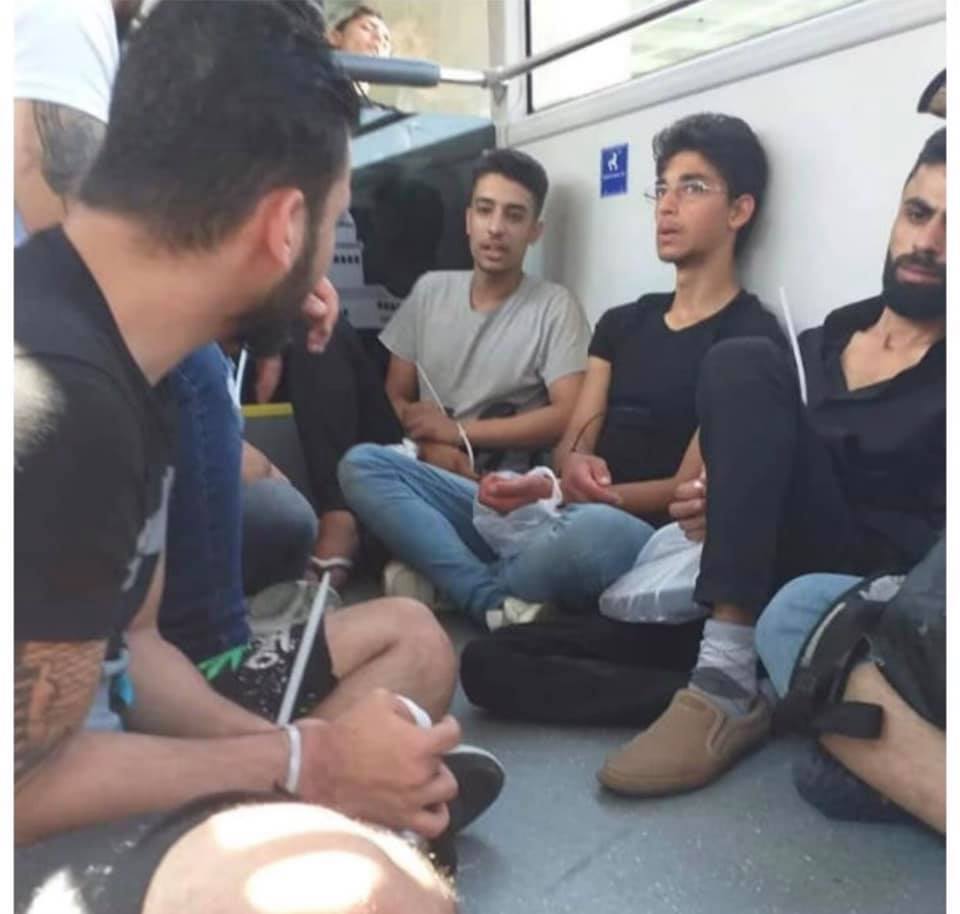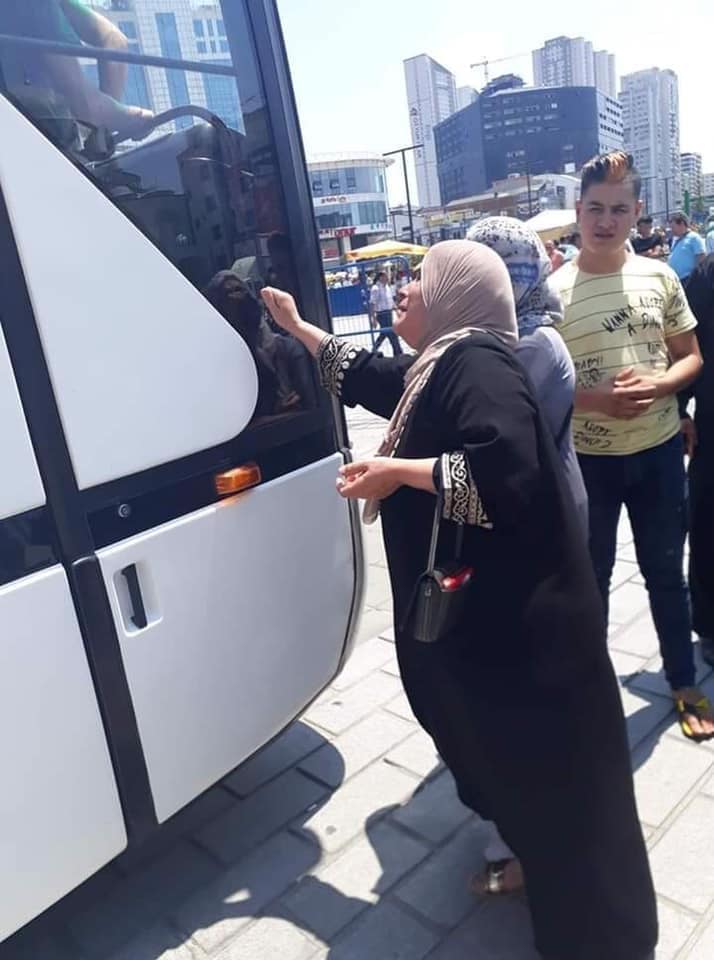15th-21st July
Mass Deportation Campaign in Istanbul Against Syrians: #StopDeportationsToSyria | Stories and reactions shared on social media about deportations | Latest statements from the authorities on the issue | Asylum seeker woman tortured in Harmandalı Removal Center | 17 Migrants killed in bus crash in Eastern Turkey | Rising Anti-Arab Hate Also Hits Palestinians in Turkey | Syrian Woman builds her own catering business with WhatsApp
News&Reports:
Mass Deportation Campaign in Istanbul Against Syrians: #StopDeportationsToSyria
Since around ten days, Turkish authorities have increased stop-and-search checks around Istanbul, targeting Syrians without registration papers (including those who are registered in other cities) or for working informally. It is alleged that many have been detained and eventually deported to Syria, some after having been forced to sign “voluntary repatriation” forms. The campaign is yet another wave of fear being inflicted on Syrians in Istanbul, following statements from key Turkish politicians about imposing stricter policies and controls on Syrians, and the rising anti-Syrian discourse, which we have covering in the past weeks.
The National reports that last Tuesday WhatsApp groups used by local Syrian activists started to spread warnings about security checks happening in metro stations, buses and public squares. The report refers to social media posts by Syrians, a video shows a Turkish police checkpoint in Istanbul’s Aksaray district, stopping young Syrian men to examine their papers, and another one shows a busload of young Syrian men after having been apprehended by authorities.
In one of these videos shared widely on social media, Amjad Mohamad Adel Tablieh tells the camera:
“I was captured in Aksaray in Istanbul during grocery shopping only for being Syrian, I left my Temporary Protection ID at home which is less than 15 minutes away from the place I was taken from. The police refused to wait 15 minutes for my family to bring it, they put me right away in the bus with many others with no information about our destination. After the bus was full they took us to Tuzla police station. We’ve been told we’ll be sent to Hatay not to Syria. We’ve all been forced to sign a “willingly returning to Syria” document. We were not even allowed to read the details written in it. I saw many cases where people got beaten up for refusing to sign it. I’m a student in Istanbul and I’m also registered as a refugee in Istanbul even though I’ve been deported to Idleb. I’m not the only one, there were a lot of other people under the temporary protection in Turkey and they got deported. During the 19 hour trip to Idleb, we were assaulted verbally and physically and got beaten up by the Turkish security/police forces in the police stations and in the bus, even at the Syrian Turkish borders. “
In contradiction , the Migration Management authorities who were spoken to by a reporter from Independent Türkçe claims that those who were deported are involved in crime or living unregistered in Turkey, while those who were not living in their cities of registration have been returned to those cities. However the operation to identify unregistered workers has been intensified, and since unregistered work is considered to be a crime, there are refugees being deported for this reason as well. According to the information obtained by the same reporter, tens of thousands pf asylum-seekers are planned to be returned by the authorities using the same method in the following months. It is estimated that 400 of them have already been sent to Idlib in the past days.
The discourse about deportations based on allegations of crime has gained much visibility lately, but the practice is based on a DGMM mandate which dates back to 25 July 2014, refugee lawyers elaborated for DW. By virtue of this mandate, Syrians are taken under detention on suspicion of criminal activity and are then removed from Turkey without necessarily going through a legal process. It is mentioned that up until now many Syrian have been deported before a final verdict was given on their alleged crime. Last May, the Turkish Constitutional Court has ruled an exemplary decision for such a case, by Y.T, who appealed against the deportation decision on the grounds of having been tortured back in Syria.
A 17-year-old Syrian textile worker in Çağlayan district told Evrensel newspaper “They have picked up a lot of people and sent them back home. Syrian workers are afraid. Employers are afraid that they will have to pay fees as high as 5,000 liras. Employers are telling us ‘I have to fire you’. There are workers who haven’t left their workplace in days”. The same report also quotes the comment of a refugee lawyer from IHD (Human Rights Foundation) Gülseren Yoleri who highlights two main problems with the deportations: one is the inadmissible prison-like conditions in the ‘removal centers’, and the second is the rule of ‘non-refoulment’ which Turkey is committed to under Geneva Convention as well as the Turkish Law on Foreigners, “When we see this issue for Syrians, the fact that they are being deported to a war environment where they have no life security, is a clear infringement on the non-refoulment principle.” (See more in Turkish)
A young Syrian man, Amr Dabool’s post (full translation in English here) about the forceful procedures around the deportations has attracted attention on social media:
“By then the Investigator’s face had changed and he seemed pissed off and so outraged and shouted saying ‘back to your room inside prison and once you decide to give us your fingerprints, come back’ (of course there were people, Syrians, inside prison for four months because they had refused to give their fingerprints). Then I gave up to the choice of giving up to being deported on staying in prison, and I signed the documents.
I was deported to Bab el Salameh border on the 16.07.2019 with a group of 40 Syrians from different Syrian cities. (…)Yesterday I tried to enter Turkey again from a point around the border with a group of Syrians but we were caught and beaten, then sent back to Syria one more time.”
Finally today, Governorate of Istanbul released a statement to confirm the continuity of deportation practices as part of its efforts ‘to combat against irregular migration’. They warn the foreigners who have a legal permit to reside in the country to always carry their IDs and travel permissions with them or to return to their cities of registration in case they are not registered in Istanbul until 20th of August, in order to ‘avoid unjust treatment’. Another snap statement from Turkey’s Minister of External Affairs informed on the suspension of EU-Turkey deal.
The practice of arbitrary arrests and forced deportations have long been ongoing in Turkey, yet this time extensive numbers of people are being indistinctively collected on a daily basis and swiftly deported to zones where their safety is not guaranteed. As Syrians, as well as other migrants with irregular status, are afraid to walk the streets of Istanbul, reactions keep growing on social media. A syrian facebook group has called for a strike on opening stores, to end the deportations. Others are calling for solidarity against deportations with hashtags such as #StopDeportationsToSyria #against_forced_deportation #SuriyeyeSınırdışınaSon
Asylum seeker woman tortured in Harmandalı Removal Center:
Lawyers from Izmir Bar Association have filed a complaint to the Public Prosecution for the crimes of torture and ill-treatment committed by security officers against an asylum-seeker woman. The woman said “They tried to forcibly extradite me. I said, ‘My mother and father were killed before my eyes in my country, if you send me there, they will kill me, too.’ They didn’t listen, continued to beat me. They spit on my face. They said, ‘You stink, dirty African.” (see in Turkish or in English) – 18.07.2019
17 Migrants killed in bus crash in Eastern Turkey:
17 people have reportedly died after a bus carrying migrants overturned in Van province. Around 50 people were also injured in the same accident. The bus with an average capacity of 18 people, is estimated to have been carring around 67 people. The governor of Van told reporters that the minibus had tumbled down a hill, hitting a riverbed some 60 kilometers (37 miles) west from the country’s border with Iran. – 18.07.2019
People&Stories
Syrian Woman builds her own catering business with WhatsApp: Having struggled with the tought labour market, Samar Al-Mallah opened the Karadish Kitchen, which she runs through a Whatsapp group in Istanbul, Turkey. “We feel that we are feeding our children,” Mallah said, “being here alone, as singles, working. Nobody’s taking care of them. But we feel very satisfied when we can make them happy, even from a meal.” (See more)
Rising Anti-Arab Hate Also Hits Palestinians in Turkey: Esther Solomon comments on resentment against Syrians in Turkey turning into a general hostility towards all Arabs, from which not even Palestinians are spared, despite the popular empathy for the Palestinian cause . She mentions two focuses of the anti-Arab hostility, the first directed against tourists from the Gulf, characterized as rich and condescending, flocking to the city to live large, go shopping and get hair transplants. The second mailnly targets the refugees from the Syrian civil war: “There is constant friction about the presence of Arabic in the public square – signifying the anxiety that refugees will change, or contaminate, Turkish culture”.
Perspectives
Kemal Kirişçi, a well-known migration scholar, elaborates on the structural obstacles and gaps for formal employment of Syrians, such as the regulations on work permits, the presence of a large informal labour market, and the language barrier as well as the non-transferability of certain labor market skills for Syrians. “As Turkish regulations stipulate, work permits cost time and money, and need to be renewed annually. Moreover, there is a six-month residency requirement for application. There is a 10% quota for Syrian workers in a given firm, and this quota applies even if the ownership structure of the firm includes a Syrian. Moreover, the design of the ESSN cash-support program dissuades formal employment, as households are immediately excluded from the program even when just a single member is formally employed.”


